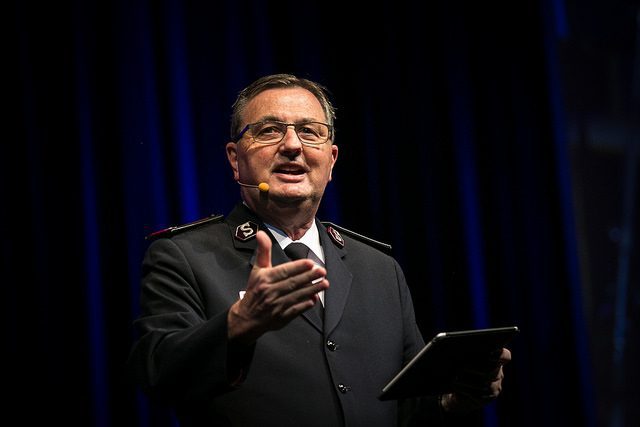Listen to this article
Listen to this article
Loading
Play
Pause
Options
0:00
-:--
1x
Playback Speed- 0.5
- 0.6
- 0.7
- 0.8
- 0.9
- 1
- 1.1
- 1.2
- 1.3
- 1.5
- 2
Audio Language
- English
- French
- German
- Italian
- Spanish
Open text
the soul of a killer. in process. by glen doss, major –. the man’s red hair was striking, but what gripped me most was the stark contrast between that flaming head of hair and the hardened expression on his face. i was lounging one saturday evening at a salvation army adult rehabilitation center men’s residence. alone at the pool table, in casual attire, i was idly shooting a few balls when “red” andersen approached. i instantly did a double take—red’s wavy, flaming hair contrasted sharply with the dispassionate expression in his eyes and the deep wrinkles on his face, so that he looked unreal, almost as if he had stepped from the pages of some comic book. “wanna play a game?” i asked, introducing myself. “sure,” he grunted. we passed the following hour shooting pool and joking. red had a hundred questions for me, all of which i answered matter-of-factly, but, though curious about him, i asked nothing. as i said good night, retiring to the guest apartment, i thought i spotted a flicker in his eyes, an indication he had more to share. sure enough, 10 minutes later a knock sounded at my apartment door; there stood red, looking quite troubled. “lieutenant, can i talk with you?” he asked. “sure,” i replied, gesturing inside. positioned opposite me on the sofa, red looked me directly in the eyes. “lieutenant, i told you i came here from prison. what i didn’t tell you was that i was sentenced there for murder.” he hesitated to check my reaction. “and while serving my time i killed two more men. i killed them with a shiv i made from a razor blade.” he spoke so bluntly and with such little inflection i was startled—and i’m sure my surprise showed. “what kind of a man is this sitting across from me?” i found myself wondering. “what kind of man could do the things he says he did and speak of them so impassively? does he have no conscience?”. almost as if he were reading my mind, red abruptly dropped his guard. the stolid expression upon his face gave way, and he broke into deep, deep sobs, his large shoulders heaving. impulsively i moved over and embraced him, holding him close. this man who was 20 years my senior seemed but a child in my arms. “yet the thing that scares me most,” he added between sobs, “is that while i was in prison, in a fit of rage i blasphemed the holy spirit. i committed the unpardonable sin! now there’s no forgiveness left for me!” he looked directly into my face. “lieutenant, i’ve got emphysema. the doctor tells me i don’t have much time! is there no hope for heaven for a man like me?”. stunned at the contrast between the man’s earlier stolidity and his present outburst, i held him tightly in my arms, rocking back and forth with him as if he were a child. i saw us as two souls clasped together, both dearly loved by god. i couldn’t begin to understand the man, for he had been down roads i could never imagine. but intuitively i knew he was sincerely terrified and that since god loved him, so must i. looking him directly in the eyes, i remarked, “red, i assure you that god loves you very, very much. your confession shocks me, but if you have a complete change of heart, i assure you that god will forgive you. looking at scripture as a whole, i know the only sin god won’t forgive is permanently rejecting christ with such finality no future repentance is possible. a person doesn’t commit an unforgivable sin simply by reciting certain words, but rather by developing a heart so hard one turns one’s back on god, permanently rejecting his offer of love and forgiveness. “red, your behavior tells me you are repentant. are you sorry enough for your wrongs to completely change your life?”. “yes! yes!” he announced emphatically. “i am extremely sorry! i just don’t know if god can forgive me, a man like me!”. i asked red if he would pray with me, and together we got down on our knees. as i led him in reciting the sinner’s prayer, his lips quivered. as we finished, his eyes were wet, but his face was aglow with joy and relief as if a mountain of guilt were now removed from those broad shoulders. at that moment, despite the significant differences between us, i identified completely with red. though his past life differed greatly from mine, there were two very basic things we had in common: we had each been burdened by tremendous guilt—we were broken men—and we had finally found release through humbling ourselves, stepping away from dependence upon our own strength and accepting jesus’ offer to give our burdens over to him. “thank you, dear lord,” i murmured. “thank you. thank you.”.
Open context player
Close context player
Plays:-Audio plays count
the soul of a killer. in process. by glen doss, major –. the man’s red hair was striking, but what gripped me most was the stark contrast between that flaming head of hair and the hardened expression on his face. i was lounging one saturday evening at a salvation army adult rehabilitation center men’s residence. alone at the pool table, in casual attire, i was idly shooting a few balls when “red” andersen approached. i instantly did a double take—red’s wavy, flaming hair contrasted sharply with the dispassionate expression in his eyes and the deep wrinkles on his face, so that he looked unreal, almost as if he had stepped from the pages of some comic book. “wanna play a game?” i asked, introducing myself. “sure,” he grunted. we passed the following hour shooting pool and joking. red had a hundred questions for me, all of which i answered matter-of-factly, but, though curious about him, i asked nothing. as i said good night, retiring to the guest apartment, i thought i spotted a flicker in his eyes, an indication he had more to share. sure enough, 10 minutes later a knock sounded at my apartment door; there stood red, looking quite troubled. “lieutenant, can i talk with you?” he asked. “sure,” i replied, gesturing inside. positioned opposite me on the sofa, red looked me directly in the eyes. “lieutenant, i told you i came here from prison. what i didn’t tell you was that i was sentenced there for murder.” he hesitated to check my reaction. “and while serving my time i killed two more men. i killed them with a shiv i made from a razor blade.” he spoke so bluntly and with such little inflection i was startled—and i’m sure my surprise showed. “what kind of a man is this sitting across from me?” i found myself wondering. “what kind of man could do the things he says he did and speak of them so impassively? does he have no conscience?”. almost as if he were reading my mind, red abruptly dropped his guard. the stolid expression upon his face gave way, and he broke into deep, deep sobs, his large shoulders heaving. impulsively i moved over and embraced him, holding him close. this man who was 20 years my senior seemed but a child in my arms. “yet the thing that scares me most,” he added between sobs, “is that while i was in prison, in a fit of rage i blasphemed the holy spirit. i committed the unpardonable sin! now there’s no forgiveness left for me!” he looked directly into my face. “lieutenant, i’ve got emphysema. the doctor tells me i don’t have much time! is there no hope for heaven for a man like me?”. stunned at the contrast between the man’s earlier stolidity and his present outburst, i held him tightly in my arms, rocking back and forth with him as if he were a child. i saw us as two souls clasped together, both dearly loved by god. i couldn’t begin to understand the man, for he had been down roads i could never imagine. but intuitively i knew he was sincerely terrified and that since god loved him, so must i. looking him directly in the eyes, i remarked, “red, i assure you that god loves you very, very much. your confession shocks me, but if you have a complete change of heart, i assure you that god will forgive you. looking at scripture as a whole, i know the only sin god won’t forgive is permanently rejecting christ with such finality no future repentance is possible. a person doesn’t commit an unforgivable sin simply by reciting certain words, but rather by developing a heart so hard one turns one’s back on god, permanently rejecting his offer of love and forgiveness. “red, your behavior tells me you are repentant. are you sorry enough for your wrongs to completely change your life?”. “yes! yes!” he announced emphatically. “i am extremely sorry! i just don’t know if god can forgive me, a man like me!”. i asked red if he would pray with me, and together we got down on our knees. as i led him in reciting the sinner’s prayer, his lips quivered. as we finished, his eyes were wet, but his face was aglow with joy and relief as if a mountain of guilt were now removed from those broad shoulders. at that moment, despite the significant differences between us, i identified completely with red. though his past life differed greatly from mine, there were two very basic things we had in common: we had each been burdened by tremendous guilt—we were broken men—and we had finally found release through humbling ourselves, stepping away from dependence upon our own strength and accepting jesus’ offer to give our burdens over to him. “thank you, dear lord,” i murmured. “thank you. thank you.”.
Listen to this article












